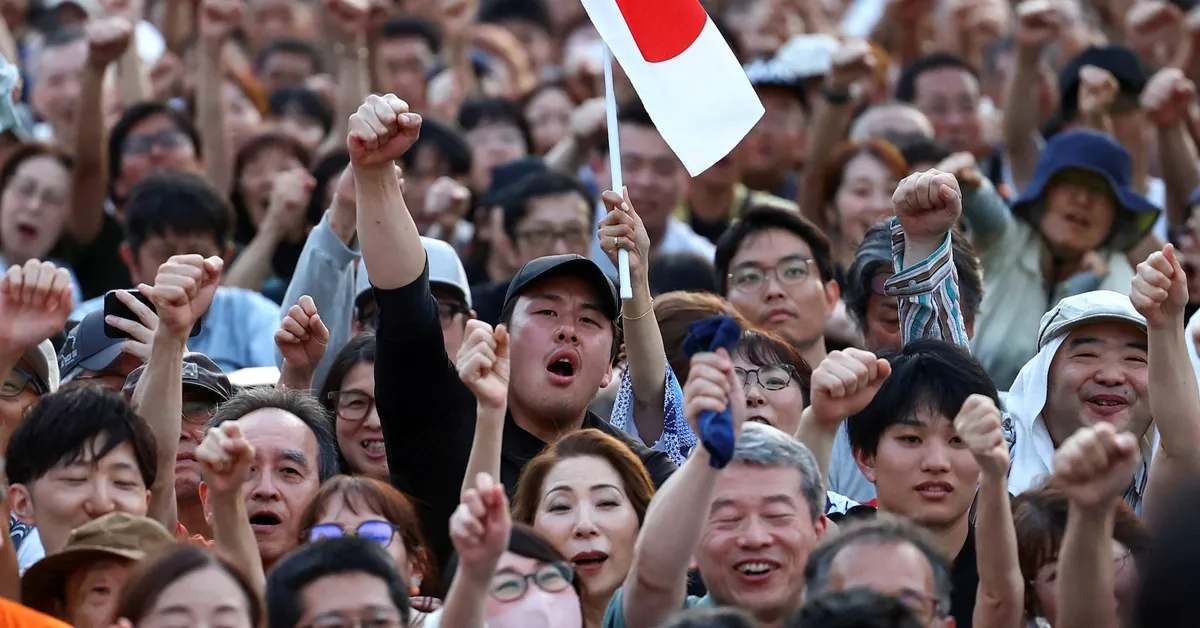
TOKYO, July 21 (Reuters) - The fringe far-right Sanseito party has emerged as one of the most significant winners in Japan's recent upper house election, gaining traction with its warnings about a silent invasion of immigrants and promises for tax cuts and increased welfare spending. Formed during the COVID-19 pandemic on YouTube, the party initially spread conspiracy theories regarding vaccinations and a supposed global elite. It has since made its way into mainstream politics with its Japanese First campaign.
In the recent elections, Sanseito won an impressive 14 seats, significantly increasing its representation from the single lawmaker it secured three years ago in the 248-seat chamber. However, it still holds only three seats in the more influential lower house. The Japanese First slogan aims to prioritize the rebuilding of Japanese livelihoods by resisting the pressures of globalism. Sohei Kamiya, the party's leader, clarified his stance in an interview, stating, "I am not saying that we should completely ban foreigners or that every foreigner should get out of Japan."
The results of this election have further complicated the political landscape for Prime Minister Shigeru Ishiba's Liberal Democratic Party (LDP) and its coalition partner Komeito, who lost their majority in the upper house. This shift leaves them increasingly dependent on opposition support, especially following their defeat in the lower house elections last October. Joshua Walker, head of the U.S. non-profit Japan Society, noted that Sanseito's rise reflects weaknesses in the LDP and Ishiba's leadership.
Polling conducted prior to the elections indicated that 29% of voters viewed social security and a declining birthrate as their primary concerns, while 28% expressed worries about rising rice prices, which have doubled in the past year. Interestingly, immigration was cited as a concern by only 7% of respondents. Kamiya defended his party against accusations of xenophobia, claiming that the public has begun to recognize the truth behind their messaging.
Sanseito's appeal lies in its ability to resonate with voters who are frustrated by a stagnant economy and rising prices, especially as a record number of tourists have flooded Japan in recent years. The country is facing a fast-aging society, with foreign-born residents reaching approximately 3.8 million last year, which constitutes about 3% of the total population—a stark contrast to the percentages seen in the United States and Europe.
Sohei Kamiya, a former supermarket manager and English teacher, has openly stated that he draws inspiration from the political style of U.S. President Donald Trump. He has also been compared to Germany's Alternative for Germany (AfD) and Reform UK. However, right-wing populism has not yet taken root in Japan to the extent seen in Europe and the U.S. Following the election, Kamiya expressed his intention to build alliances with other small parties rather than collaborate with the long-ruling LDP.
Sanseito's emphasis on immigration-related issues has already begun to shift Japan's political discourse to the right. In the lead-up to the election, Ishiba's administration announced a new initiative aimed at combating crimes and disorderly conduct among foreign nationals, pledging a target of zero illegal immigrants. Kamiya has attempted to moderate some of the party's more controversial ideas, but during the campaign, he faced backlash for labeling gender equality policies as detrimental to women's roles in society.
To expand its appeal beyond its core demographic of younger men, Sanseito fielded a diverse array of female candidates during the recent elections, including the singer Saya, who successfully secured a seat in Tokyo. Like other opposition parties, Sanseito has advocated for tax cuts and increased child benefits. However, its substantial online presence sets it apart from competitors; the party's YouTube channel boasts 400,000 followers, surpassing all other parties and tripling the LDP's follower count.
According to Kamiya, Sanseito's breakthrough in the upper house is just the beginning. "We are gradually increasing our numbers and living up to people's expectations," he stated. With an ambitious plan to secure 50 to 60 seats, he believes that the party's policies will soon become a reality, shaping Japan's political landscape for years to come.
Reporting by Tim Kelly, John Geddie, and Kantaro Komiya; Editing by Clarence Fernandez, Dale Hudson, and Lincoln Feast.